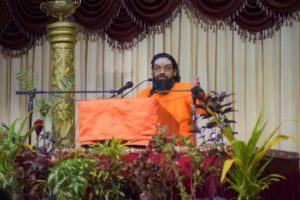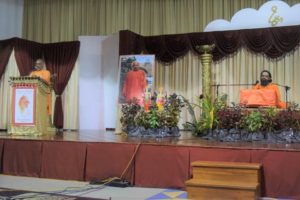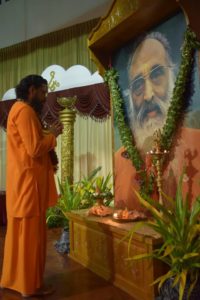Yagna on ‘Shri Ram Gita’ – October 2017 – Chinmaya Mission Trinidad & Tobago
Talks on “Shri Ram Gita” – by Swami Abhedananda
(Gyan Yagna conducted from 1st Oct till 7th Oct, 2017 – at Chinmaya Mission Trinidad & Tobago)
Key Points from the Discourses
Day 1
Giving a spiritual start to the month of Oct, Swami Abhedananda enthralled the devotees of Chinmaya Mission Trinidad and Tobago with beautiful gems from the Ramayana. On the inaugural day of the talks Swamiji beautifully elaborated on the glories of Bhagwan Ram and Shri Lakshmanji and emphasised on the importance of having the Lord in our lives. Here are few snippets from the beautiful talk.
- The irony of our life is that what is most needed is felt less required and hence we don’t desire it; and what is least needed, we desire that a lot. We feel that food, money, family, holidays etc. are very important, but we do not feel that God, faith in God, and love for God is so important.
- Life is not meant to just eat and drink, life is meant to melt our heart for Lord, life is meant to chant Lord’s name, life is meant to drown in His devotion, life is meant to increase our power of renunciation, life is meant to dedicate and offer ourselves for the Higher.
- Life can be a very joyous experience. Life can be full of bliss and festivity. Life is not meant to mourn. Life is not meant to be sad and angry. There is bigger purpose. There is a big area of joy and fulfillment awaiting for us.
Going to Bhagwan Ram’s home:
- The Ramayan is Ramji’s house; Rama+ayan, ‘ayan’ means house. If you want to know about Ramji, you have to go to His house. Each room in the house is implied by each ‘kand’ of Ramayan. In this yagna, let us go to one of the rooms of Bhagwan Ram’s house called Aranya-kand where we will see about ‘Ram Gita’. Let us revel in Ramayan. Let us dive into the character of Bhagwan Ram.
- Goswami Tulsidasji says in Ramayan that wherever Bhagwan Ram went, He sprinkled absolute joy and bliss. When Ramji started living in the forest, it is written that, not just the people around, but even the birds and the animals were happy. Tulsidasji says that even the stones and mountains were joyful.
- You should test your spirituality by the smiles of people around you. Whatever Puja you do, or paath you do, all is good, but what is more important is how many people are happy because of you.
Character of Shri Lakshmanji:
- When Ramji asked Lakshmanji to stay back in Ayodhya while Ramji was leaving for exile, Lakshmanji said, “I don’t know dharma, I don’t know my father or mother, I don’t know my kingdom, I know only one relation and that is with You. Just like a small baby will be left alone without a mother, similarly if You go, I will be left without my mother and father.” Lakshmanji’s words melted Bhagwan’s heart.
- One day, as Bhagwan Ram sat down in the forest, Lakshmanji said to the Lord, “Bhaiya, You are the Lord of the whole world. I want to ask you something considering You as my Lord.” This is a very beautiful line because it depicts the ‘myness’ that Lakshmanji had for Bhagwan Ram. Unless there is a ‘myness’ for the Lord, joy doesn’t come in life. Developing myness for the Lord is called Bhakti… “He is my Bhagwan!”
- It is said that during the 14 years of exile, Lakshmanji never slept even once. Even before Bhagwan Ram could ask for anything, water, fruits etc., Lakshmanji used to rush and bring whatever was required. The earning of a devotee is how much he has melted the heart of the Lord.
- Believer is one thing, but being a lover is another thing. Believing in God is good, but loving the God is best. When you have God in your life, you don’t need anybody else!
Day 2
On the Day 2 of the Yagna on “Shri Ram Gita”, Swamiji beautifully elaborated on the importance of seva in our lives and how each one of us is engulfed by Maya (illusion). We bring to you some gems from Swamiji’s Day 2 talk:
Personalizing the Lord
In the beginning of Ram Gita, Tulsidasji says that Lakshmanji approached Bhagwan Ram and said, “Oh Lord! You are the Lord of the Universe, but for me, You are my Lord. I love you.”
- Unless we personalize God, emotions won’t develop for the God. Unless we possess the Lord; unless we say, ‘Oh Lord! You are mine,’ Lord doesn’t give us a special response. Bhagwan’s response depends on how much we feel that other than the Lord, no one else is there in our life.
- As long as we have other options in life, other goals in life, Lord will not come completely in our lives. For making the Lord fully available, we have to say, “Oh Lord! There is no one else in my life other than You. I am ready to lose everything to get You!” As long as one feels that the world can give solutions, the person cannot become a seeker.
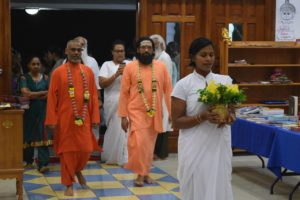 Seva – Melting the heart of the Master
Seva – Melting the heart of the Master
Lakshmanji further says to Bhagwan Ram, “Oh God! I will leave everything and I will serve the dust of Your feet.” This line of Lakshmanji is very touching and holds a deep message about ‘Seva’.
- Unless somebody serves you, your heart won’t melt. Unless somebody sacrifices for you, you cannot be happy with that person. If somebody constantly gives you, your heart is sure to melt.
- Serving is very difficult because we have to leave our ahankaar, our comforts, our laziness, our ego and jealousy. It is very easy to say ‘I am serving,’ but very difficult to serve.
- In serving, you have to become very small, you have to get scolding at times. For serving, you have to make your mind softer.
- We feel success in life is in earning money, or having a nice house, or marrying, or having a good profession, very rarely we feel that success in life is melting the heart of a saint or the Lord. Very rarely we feel that success in life is melting the heart of our Guru.
- Lakshmanji melted the heart of Bhagwan Ram. Seva is the way to enter into the heart of a Mahatma, it is the way to love him. Without serving, nobody can enter even your heart, what to say of God’s heart!
From Ego to Egolessness
- Ego is nothing but the desire of separateness in joy. ‘My joy, my security, my house, my personality, my education, my name, my fame…’ is all that an egoistic person thinks about. An ahankaari person doesn’t think about God’s happiness or Guru’s happiness, he only thinks about his own happiness.
- The cause of sadness in a person is his abhimaan (ego) alone. An abhimaani person doesn’t give joy to anybody; he only seeks his own joy.
- Life is not meant to just do bhog (fulfilling worldly desires), but life is meant to give-up our ahankaar (ego). There is only one consciousness and everything other than that is just an illusion. Whatever a person sees, whatever he touches, all is Maya. Nothing is true in this world, nothing is permanent here. Then what is there to be egoistic about?
- A person who can run very fast today, one day (in his old age) finds it difficult to even stand straight. Such a weak body we have, then what to have abhimaan (pride) for? We don’t even know any one subject in its totality; we don’t have control over our sleep; we have no control over our thoughts, our anger and sadness; then what to have abhimaan for?
Avidya Maya
In answer to Lakshmanji’s question “What is Maya?” Bhagwan Ram describes two types of Maya – ‘Vidya Maya’ and ‘Avidya Maya’. Avidya Maya is described first. It is that Maya which causes extreme sorrow.
- The world is compared here to ‘bhav koop’. ‘Koop’ means ‘well’ and ‘bhav’ means ‘the constant wants in us’. ‘I want to become graduate, I want to get married…’ etc. When a person passes away, the physical body dies but his subtle body (thoughts) doesn’t die. Therefore, to exhaust his wants, the person gets another life. Because of the thought of wanting joy from the world, the person is born again and again in this world.
- Fortunate are those who are not entangled by this Maya. Fortunate are those who get joy in Bhagwan’s name and His form. Meerabai used to say, “I love the feet of my Guru only, and because of this, my ocean of transmigration has been dried up.” This is called going across Maya.
- The world is not a loyal place. It will leave you very fast. Every experience of the world says – ‘Don’t come too close to me… keep safe distance!’ If you are sad, it is because you got too attached to someone or too obsessed about someone. One must get close to God….get close to Bhagwan Ram!
- One can cross Maya by taking Lord’s name, by listening to Lord’s katha, by having Guru-bhakti and Ishwar bhakti, by doing puja and jap. Every night when you go to sleep, say to Bhagwan, “May I love you more every day. May I not be attracted towards this world. May Your Maya not touch me.” Life is not meant to be caught-up in this world; life is meant to be offered to the Lord, and to the Guru.
Day 3
On the third day of the Yagna, Swamiji in his beautiful talk, enlightened the devotees with the wonderful and timeless knowledge given by Lord Ram to Shri Lakshmanji. We bring to you some key take aways from the talk:
Living a non-deluded life
- In life, we should know what to leave, what to take, what to love, what not to love, whom to entertain, whom not to entertain, what to feel as important, and what to feel as not important. Life should not be squandered away in things which make us loose. We are not meant to be sad under any circumstances, we are not meant to lament and sob, we are not meant to be angry.
- We should not live a blind life. We keep doing a lot in life, run here and there, educate ourselves, marry and have children, buy houses, love some people and hate others, go out for enjoyment and recreation. But we don’t know that all this superficial joy evades us, eludes us. And the reason is that we don’t know what is Maya, we don’t know about Bhagwan, we don’t know the reality about the world.
- Ramayan is not just for chanting, it is to give us direction in life. It is to tell us where we are and where we should have been. Bhagwan, by His actions, shows us how to live, how to think, and the meaning of a pure and quiet life.
- We hold onto Maya, we hold onto something which is flimsy, and then we question the happenings around us. If we hold on to something finite, something which is constantly running away, how can permanent joy be there, how can peace and quietness be there?
- World has never given happiness to anyone. Rather, all our sorrows are because of something or someone of the world after which we run unnecessarily… Our sorrows are because we do not follow God.
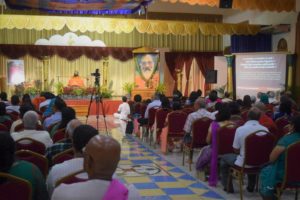 Vidya Maya
Vidya Maya
While giving answers to Lakshmanji’s questions, Bhagwan Ram talks about ‘Vidya Maya’. Vidya Maya is the adorable Maya with which Lord has made the world.
- What is Vidya? That which liberates from something is Vidya (knowledge). Ex: If you have knowledge of medicine, you can be free from medical problems; if you have knowledge of car mechanics, you can be free from the problems of the car. Every knowledge liberates you from some problem.
- Our basic problem is that – we don’t let go of our desires. Sorrow is nothing but the expression that we feel that we lack something in our life. The nature of human mind is that it searches something which it doesn’t have. And what it doesn’t have, it holds on to that.
- Nobody’s life can have everything. In everybody’s life, Bhagwan has taken away something. Even Bhagwan Ram and Bhagwan Krishna didn’t have everything in their lives. Most of His life, Bhagwan Ram was without Sitaji. Bhagwan Krishna didn’t have Devakiji in His early childhood, and when He had Devakiji, He didn’t have Yashodaji.
- Spirtual knowledge is that knowledge which takes away this emptiness from your heart. Even if you don’t have anything, you feel ‘I have everything.’ This knowledge which makes you feel that you have everything even when you have nothing, this is called ‘Adhyatma Vidya’. What do saints posses? They have no mother, no father, no money, nothing is there. But they have the knowledge that ‘I don’t require anything because I am already full.’
Dispassion
In Ram Gita, Bhagwan Ram explains to Lakshamanji what is Vairagya (dispassion). There are two types or classes of Vairagya (dispassion) – one is ‘Apar Vairagya’ and other is ‘Param Vairagya’.
- Apar Vairagya
- Apar vairagya is seeing the object of attachment as full of sorrow and leaving it.
- Anything in this world if you get attached to, you will get sorrow. We get attached because we get some joy or somebody satisfies some vasna in us. And more a person satisfies our vasnas, closer we get to him.
- World is not meant to get very close to. Because more we get close, more is the expectation. With more expectation, a time comes when the person fails to fulfill our expectations. We want him to give us joy every day, which leads to obsession and possession and ultimately sorrow. Thus in Apar vairagya the seeker sees this ultimate sorrow everywhere and hence does not get attached anywhere.
- Param Vairagya
- Param vairagya is – you have so much of sense of joy in the Lord, that automatically the world is left. Such dispassion Hanumanji had, Bharatji had, and Lakshmanji had. Their sense of joy in the Lord was so high that they never saw the world.
- Bharatji was offered the whole kingdom. But not even for a second he thought of enjoying the kingdom. Instead he persuaded everyone to go to the forest and convince Bhagwan Ram to come back to Ayodhya.
- One who loves the Lord a lot, he is not attracted by the charms of the world.
- The joy of meditation is much more than the joy of the biggest kingdom. The joy of japa, puja, is much more than the joy of indulging. The joy of serving the Guru is much more than the joy of enjoying the world.
We are attracted towards the world because we are not attracted towards the Lord. Biggest fortune of a person is that the Lord appears good to him. Dispassion cannot come unless you have strong attachment with the Lord.
Day 4
On the 4th Day of “Shri Ram Gita” yagna, Swami Abhedanandaji made the devotees delve deep in the verses of the beautiful text and fetch the priceless gems of knowledge hidden within. We bring to you some precious take aways from the talk:
Our understanding governs our responses
- In this world, challenges come in everybody’s life, sometimes good situations come, and sometimes bad situations come. It is not possible that we don’t respond to the situation in front of us. But what determines our responses is our ‘understanding’. Better is our understanding, better are our responses.
- Bhagwan Ram was promised to be coroneted as the king of Ayodhya, but when His step-mother asked Him to go to the forest, His response was absolutely profound. He became very happy and said, “I am happy to go to the forest as I will get the opportunity to fulfill the words of my father, and my mother Kaikayi would be satisfied. I will get the company of sages in the forest, and best thing that would happen is that Ayodhya would get a great king like Bharat!”
- Situations have no power in themselves; we give power to the situations. Our understanding is such that it disturbs us, shakes us. Let us rectify our understanding. Let us know about the world, about Ishwar, about jeeva, about devotion and dispassion, as elaborated in Shri Ram Gita.
- Jeeva is the one who doesn’t know Maya, who doesn’t know Ishwar, one who is totally ignorant. Jeeva is the one who doesn’t know what is his duty, what is not his duty, where he should go, where he shouldn’t go. Jeeva is the one who blindly keeps moving in his life and does numerous mistakes.
- For the jeeva, everything is very real. Body is real, relations are real, house is real, parents are real, children are real, fame is real, success and failure are real. He doesn’t know Maya. He gets very sad and very happy on small issues. He doesn’t know that it is wrong to have attachment and ego.
- The jeeva doesn’t know that Ishwar is the main doer in this world; whatever Ishwar does, that alone will happen. He doesn’t know that if he prays to Ishwar anything can happen. He doesn’t know the power of devotion, the power of chanting Lord’s name.
- Jeeva doesn’t know that Ishwar is the one who can give bondage as well as freedom. He doesn’t know that Ishwar is all-knowing and all-powerful and that is why Ishwar knows all our actions and is able to give us the fruits-of-actions.
- Jeeva doesn’t even know himself that he is ‘Chaitanya Atma’ (Consciousness alone).
- Jeeva doesn’t know that he gets whatever are his fruits-of-actions and so he should do good so that he gets good fruits-of-actions. He does bad actions but wants good fruits.
- The jeeva lives a deluded life. An ordinary person’s ambition is only that, ‘Let me be happy and let my children be happy. Let me have a nice house, let me have nice food etc.,’ this is all he aims for.
Ishwar – The giver of bondage as well as liberation
- It is the fruits of our actions that make us either a devata, or a demon, or a human being or an animal. And it is the Lord who gives us these fruits. He gives both bandhan (bondage) and moksha (liberation). He is the one who prompts the Maya. He is Maya-pati (Lord of Maya) and we are Maya-daas (servant of Maya).
- We don’t know what is the glory of Lord. We don’t know what is the meaning of Lord. We don’t know what is the meaning of bhakti (devotion) of Lord. We live an oblivious life with our whimps and fancies, and vasnas and ego.
- We feel what we think is right but what is right we don’t think. This is the ‘jeeva bhaav’ in us. But the fact is, it is the Lord who is dominating our lives.
- If Bhagwan does not create a situation, you cannot get anything. Who wants to become poor, or wants to suffer in an animal body… but they become so because of Ishwar’s will, because their actions were like that. Lord can give this bondage. Therefore, one must think well before acting.
- Lord is the one who can give moksha (liberation) too. If Bhagwan wants to give moksha, he gives Guru in your life, He gives shastra (scriptures) in your life, He gives satsang and puja in your life. He is the maker of all situations. Lord only gave the knowledge of Gita to Arjun because He did not want Arjun to be bound.
- When the Lord is pleased with us He takes us to knowledge. It is the Ishwar iccha (will of Lord) which leads to Guru-praptti (getting a Guru in our lives). Guru-praptti leads us to shravan (listening to Lord’s glories), and shravan takes us to gyan (knowledge of the Self), and gyan takes us to moksha.
Dharma gives Dispassion
- Dharma is a medicine; it treats our vasnas. Our problem in life is our vasnas; we want popularity, love, attention etc. Dharma imposes a set of rules on every individual in his particular stage in life. As a student, as a wife, as a daughter, as a husband, as a mother-in-law, we are supposed to do certain thing and not supposed to do certain things. If you perform your dharma, your vasnas will exhaust.
- Performance of dharma gives dispassion because when we perform dharma, we follow what we are supposed to do and we don’t follow our own desires. This helps us to get rid of our baser tendencies. One who has dispassion, he is a king, because he is happy everywhere in every situation.
- Dispassion is a conviction that ‘I don’t need any situation, I don’t need any circumstances, I don’t need any person, I don’t need any success to be happy. I am free from all and I will be free from all. Whether I am here or there, with him or her, I don’t need anybody.’ Biggest sources of dispassion are satsang and bhakti of Bhagwan. We must pray to God that we should have dispassion.
Bhakti – Melting of the Lord
- Bhagwan Ram continues to tell Lakshmanji, “Bhakti is that by which my heart melts very fast.” Bhagwan’s heart does melt for His devotees! If somebody gives you one flower every day, and praises you every day, won’t your heart melt for him? Here melting means “I want to do something for you, I want to give you joy.”
- Kevat had a dream that one day Bhagwan Ram will come on his boat. He dreamt every day, where Bhagwan would sit, and how he would take the Lord across. This melted the heart of the Lord, and one-day He did go to Kevat and sat on the exact place where he wanted the Lord to sit.
- Every day you go to Bhagwan and say Bhagwan “Please be happy with me. I don’t want anything, you just be happy.” When Bhagwan melts He gives His love, dispassion, and His bhaav to you.
Day 5
On the 5th Day of the Yagna Swami Abhedananda ji beautifully unravelled the different aspects of Bhakti and how important it is in our lives. Here are some snippets from the beautiful talk.
Freedom in choice
- Life is made by right choices and is destroyed by wrong choices. You are not free to choose what you get in life, but you are free to choose what you think about what you get.
- You must know your area of freedom, and your area of bondage. You have no choice where you will be born; you have less choice on how much money you will have, what kind of health you will have, what kind of spouse and children you will have. What you get, what you will lose, choices are lesser, but what you do with what you get is your choice.
- Sadness is nothing but an expression of wrong choice of thinking. Joy is an expression of right choice of thinking.
- The answers that Bhagwan Ram gave to Lakshmanji are lessons for us. When Bhagwan Ram said, ‘Knowledge is that in which one sees Brahman all around,’ it means that if knowledge is there, we will be free from all attraction and aversions.
- Bhagwan Ram talked about Maya because if a person understands Maya, he will understand that this world is not to be held on to. Maya alone expresses as wrong understanding and makes one see reality in this impermanent world.
- We think everything is very permanent, very real here. Can a jeeva have any real relation with another jeeva? Is there anyone who has been permanently related to us? Is it not that whole life we squander away in sense pleasures and forget what the true purpose of life is.
Bhakti & the need for Bhakti
- Bhakti means – being related to the Lord. You get related to the one who gives you joy. The day a person discovers that Lord alone gives him all the joy, he becomes a saint, he becomes a sadhu.
- When a person understands that the world is not a loyal place, and Lord alone is loyal, he becomes a Mahatma.
- We give time to so many people in this world but there is not even a single person who is happy with us at all times. The one who gave us food, shelter, one who protected us when we were in the womb of our mother, how much time did we give to Him? We do puja and path but that too very hurriedly. We go to people outside and tell them we love them but do we ever go to God and tell Him, ‘Bhagwan, I love You too!’
- When you love someone, you miss him when he is not around. Do you ever miss Bhagwan? The day you start missing Bhagwan, you become a devotee. And when Bhagwan sees that you miss Him, Bhagwan melts. When Bhagwan sees that you love Him, He melts.
God is the biggest requirement of our lives
- Our lives have more uncertain things than certain things. Our house is uncertain, children are uncertain, etc. The area of uncertainty of any person is the area of worry. How can one deal with such uncertainties without devotion!
- When we will realise that there is nothing impossible for the Lord, we will become a saint. Saint is not just the name of a person, but a saint is the one who depends only on the Lord, he has no other support.
Pleasing the Lord
- There is no life without Bhakti. There is no soul in our schedule if God is not pleased. Supposing you love someone, will you not do what he likes? When you love Bhagwan, will you not do what He likes? A lover cannot tolerate that my beloved is unhappy with me.
- There is no bigger goal in life than to please Lord. And when somebody pleases the Lord, the Lord melts and when Lord melts He gives everything.
Bhakti is free & easy
- Bhakti is free, you don’t need money to do Bhakti. We aim to do what is difficult, we want to be rich, want to please people, but isn’t chanting the Lord’s name, easier? When you call Ram, won’t He come? When you say Ram, add little anxiety into it. Take the Lord’s name, do some Bhajan, chant anything in front of Him. He will surely come. Coming, means the Lord is ready to do something for us.
- We can love only those from whom we get responses. People cannot respond much, and will eventually leave you. It is only the Lord who responds always. Chant His name with love, your life will change after that.
Day 6
On the 6th day of the monthly gyan yagna, Swami Abhedananda beautifully described the true meaning of Bhakti and how to attain it. Below are select excerpts from the day’s discourse.
True meaning of Evolution and Maturity
- World gives us situations, and we experience those situations in our own ways. Which situation will come when is not in our hands; but what learning we take out of that situation is in our control. From a very disturbing situation, one can bring out peace and smile. From a very quiet situation, one can bring out disturbances. No situation can over power the one who has the wisdom to see it properly.
- Depth of a person is determined by how he responds when he is faced by some difficult situation. When Bharatji was offered the Kingdom of Ayodhya, instead of getting elated, he only thought about the hardships that Bhagwan Ram had to go through in the forest. When Bharatji came back from Chitrakoot to Ayodhya, he didn’t live in the palace, he went to a place called nandi-gram, and dug a place underground thinking, “if my brother sleeps on the floor, I will sleep below him.” Bharatji saw the opportunity of renunciation in bhog.
- Bhagwan Ram went through so much trouble but he never complained once, against Kaikayi. When all mothers went to Chitrakoot, Ramji first offered pranaams to Mother Kaikayi. There was no trace of anger or hatred. The perfection of a person is known by how he deals with imperfect people. The more immature the person in front of you, more maturity you need.
- Life is not what is coming from outside, life is what we are making from inside. Every day is an opportunity to cleanse our mind and increase our devotion.
- Whole purpose of our life is to melt the heart of Lord. Puja, jap, path, satsang, every action has the same purpose. Happiness of a person is dependent on how much Lord is happy on him. Happier the Lord is on you, more He protects you. If somebody is unhappy, it only means Bhagwan is not pleased with him.
- Glory of Bharatji was that Bhagwan Ram was very happy on him. It is said that Bhagwan Ram used to do jap of Bharatji.
- Lord is the head of this world, and if we are living in this place of Lord, and if He is not happy, then how can we be happy? Desire to make the Lord happy, itself will make Him happy.
- Secret of saints are that they are able to make the Lord happy. When Lord is happy, everything happens nicely. The glory of living is that you make the Lord happy.
- Many incidents happen in life through which Lord tells you that ‘I love you’ and when you experience the love of Lord, it is not possible that you won’t love him. Seeing His love, we love Him.
- God loves his devotees more than they love Him. When Hanumanji met Bhagwan Ram for the first time, he fell at the feet of Bhagwan. Seeing Hanumanji, Bhagwan Ram cried so much that the whole body of Hanumanji was wet with tears. Unless somebody has been loved by Lord, he will never know how to love Lord. Love alone attracts love.
Developing sensitivity
- The main criterion of loving is, the inability to see the beloved in pain. Therefore, when Bharatji saw Bhagwan Ram in the garb of a vanvasi, he was extremely saddened. Do we experience the pain of Bhagwan? The day we will experience the pain of Bhagwan we will become a devotee.
- Who is regular in Japa, who has pain of not doing Japa. Who is regular in Puja, who has the pain of not doing Puja. Who is regular in Guru-seva, who has a pain in not doing Guru-seva. The pain that we are not loving the Lord enough makes us a devotee.
- Loving requires one to have high level of sensitivity. An insensitive person cannot love another person, leave alone loving God. Being sensitive towards the Lord and accepting everything He gives as prasad, is the fulfilment of living.
Saints take us to the Lord
One cannot get Bhakti unless a saint comes in life. Saints, are the ones who tell to the Lord, that a person should get Bhakti. When we offer naivedya, we don’t just keep it front of the Lord, we offer it to Him and pray to Him to eat, similarly saints go to Bhagwan and say, please take this devotee and give him love and devotion. Unless some saint has been there, God will not accept you directly. Therefore, we should melt saints’ heart first to melt God’s heart.
Process of Bhakti of Lord
- Firstly, we should have love for the feet of the Lord. Then we must do our Swadharma. Swadharma is always difficult because we have to do some sacrifice. If duties are there, there has to be some difficulty. You must give up some ahankaar, raag, dwesh, and therefore when we perform our Dharma, our vasnas get cleansed. Unless we do our dharma, nobody is pleased with us, because our duty is somebody’s right. If we don’t do our duty, we take away somebody’s right.
- More we perform our duties; more is God pleased with us. When God is pleased, He gives situations, so that we can have His devotion. If situation is not there, devotion cannot come to us. Love for the Lord does not come by itself, only Lord must give His love to you.
- Devotion comes when a person has performed his duties properly and it is the devotion which gives rise to dispassion in a person. When devotion comes, then the person is automatically quiet. The sense of importance on sense objects goes away.
When the love for the Lord is high, then the love for the world fades away. This is the process of Bhakti!
Day 7
On the last day of the insightful Yagna Swami Abhedananda ji beautifullyi elaborated on the means of and the ultimate goal in Bhakti. Here are some keep pointers from the talk:
Gyan yagna is not for entertainment; it is not for listening to some casual talk, it’s a serious matter, it’s concerning our life and our next birth, it’s concerning our sorrows and joys.
Purpose of Human birth
- Life is not meant for sensual indulgence, or just for earning money, or for making relatives and friends. Life is meant for loving the God. Life is meant for getting out of all our sorrows forever. Life is meant for conquering our vasanas and eradicating our lower desires.
- If we do only that much what animals do i.e., eat, sleep and indulge, then it was better to be an animal. Animal body is meant for sensual indulgence, and therefore they are called tiriyak or parallel to the ground. But human body is straight, with head on the top representing that having the power of discrimination and seeking the highest is the most important goal in life.
- How many of us have loved God? We have given time, energy and attention to our family, job, friends, but how much attention have we given to the Lord and to our Gurus and the saints? All loving is nothing but giving joyful attention to the beloved. How much of our thoughts and service have we given to the Lord?
- Don’t love the world at the cost of loving the God. In life, everyone has its own place, and Lord has its own place. Have the Lord occupy the supreme place in your life. Giving His supreme place means, saying to the Lord, “Oh Lord! In my life, You are the best. You are the one whom I will serve whole life. I will fulfil all Your desires!” There is nothing more beautiful in this world than to offer our time and thoughts to the Lord.
- Life is meant to love Bhagwan. Never think that you love Bhagwan a lot because if you think like that your love will start lessening. Always think what Lord has given is much more than what you have given Him.
- Joyful memory of the beloved is called love. When a devotee says ‘Ram Ram’, he has so much of love for Bhagwan that his voice gets choked. When Bharatji used to take Ram naam, stones used to melt, birds used to cry.
- We are multi-pointed lover. We don’t love the God completely, we love the world also. Multiplied attention and divided love is equal to multiplied problem. We let anybody and everybody enter in our heart. We let lust, anger, worry, jealousy etc. enter our heart, but we don’t let Bhagwan Ram enter our heart. We give time to everything but God. Purpose of our life is not to throw away our love.
Means of Bhakti Sadhna
- One who has importance for devotion, he alone will think how his devotion can increase, how he can love God? Very rarely do people have this question.
- For us, money is more important, power is more important. We don’t know that bhakti is not a small thing. We can get knowledge, we can get dispassion, we can get everything from bhakti.
- For bhakti, first thing you do is have a lot of love for the one who can tell about God, who can tell what the sense of life is. On must go to saints, touch their feet, ask forgiveness from them, and ask them to tell me about Bhagwan Ram, Bhagwan Krishna… Fortunate are those people who make saints happy.
- Second thing you do is perform your dharma. Everybody is born for a particular action, he has his own particular dharma. Performance of dharma, leads to love for the Lord in our hearts. Such a seeker then wants to please the Lord with every action of his; he does the bhajan of the Lord with a firm mind. His every action is permeated by Lord.
- To gain bhakti of the Lord, one must do seva of Guru, seva of mother and father, because when they are pleased, they bless you. Seva does not only mean pressing the feet; it means doing what they want.
- Serving the Guru means having the bhaav that, “I will surrender my desire when my Guru’s desire and my desire clashes. I will do everything from morning to night to make my Guru happy. If required I will wash clothes, or mop the floor, but somehow make him happy.” This alone pleases the Lord.
- When such a purified seeker thinks about the Lord, then he experiences extreme joy and tears trickle from his eyes. It is said that even when someone spelt Ravan in front of Lord Shiva, He would go into samadhi (meditation), because even with the mention of the letter ‘Ra’, He could only remember ‘Ram’ and no other word. There is no bigger fulfilment of life than being overjoyed thinking about the Lord.
- Thus, we had seen that, first sadhan (means) of bhakti is vipra prem (respecting the saints), second was performing the dharma. Third is vairaag (dispassion), fourth is offering all actions to the Lord. Fifth sadhan is loving the saints, and sixth sadhan is doing bhajan. Seventh sadhan is seeing Guru, mother, and father as manifestation of God. Eight sadhan is getting overjoyed with the thought of the Lord. This is the advancement in sadhan.
Bhagwan Ram says that when such a person without any desire and hypocrisy calls Him, Bhagwan is under his control. Bhagwan declares here that, ‘I live in the heart of such devotees!’ Bhagwan is present in all hearts, but He is not expressed in every heart. Let Him express in your heart!




